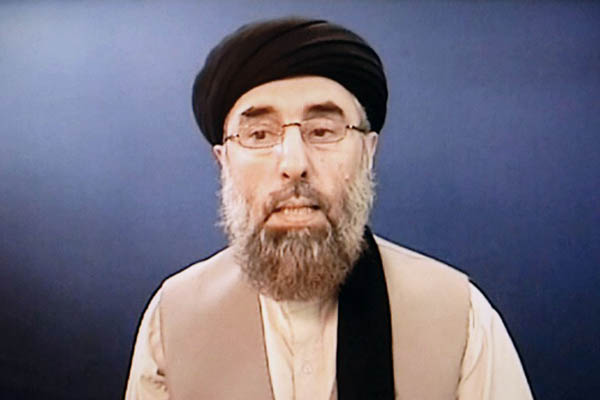
Gulbuddin Hekmaytar. AFP
Gulbuddin Hekmatyar says he has no reason to apologize for war crime allegations as he was merely ‘defending’ the country.
Afghan warlord Gulbuddin Hekmatyar roundly refused to apologize over war crime allegations in an audio message to AFP, even as his group attempts to rebrand from a radical, misogynistic movement to a mainstream political force.
A landmark accord signed with Hezb-i-Islami in September is Afghanistan’s first peace agreement since the Taliban launched their insurgency in 2001, and paves the way for Hekmatyar’s political comeback after nearly two decades in hiding. The deal grants Hekmatyar—accused of killing thousands in Kabul during the 1992-1996 civil war—legal immunity from past crimes, sparking revulsion from human rights groups. But Hekmatyar shrugged off such criticism.
“Those who have committed crimes or have been charged by a reputable court should apologize. Not those upon whom war is imposed, who have resisted the invaders, defended themselves and defended the country,” Hekmatyar said, his voice a relaxed drawl.
The audio file from Hekmatyar, a former Afghan prime minister and one of the most controversial figures in the country’s modern history, was in response to questions AFP sent him through his son, Habiburrahman. The clip was delivered last week by Mohammad Karim Amin, Hekmatyar’s chief negotiator.
It came as Hezb-i-Islami is scrambling to repair Hekmatyar’s public image as a murderous warlord, with Karim holding daily meetings with civil society activists and women’s groups in a luxury hotel in Kabul that sometimes last up to 18 hours a day. More significantly, Hekmatyar has sought to project himself as a “peacemaker” with the Taliban, a more powerful insurgent group that has repeatedly rebuffed government calls for talks.
“Hezb-i-Islami can act as a drive belt linking the Taliban and the government,” Karim said after Hekmatyar called for Taliban reconciliation during the signing ceremony of his peace deal in September.
Karim said dozens of low-level Taliban commanders have reached out to him, but a Western official in Kabul said Hekmatyar’s largely dormant group was trying to punch above its weight. “The government hopes to use the Hezb deal as an opening for further Taliban negotiations, but I’m not convinced the Taliban leadership considers Hekmatyar as a serious influence on their decision-making,” he said.
Hezb-i-Islami, whose followers were once accused of throwing acid at women, has also sought to brush aside its reputation for misogyny. “I don’t see any considerable women’s groups that have opposed the peace agreement,” Hekmatyar said. “But if you mean a few women who gathered in front of media cameras in a small park in Kabul carrying four or five banners, is this even worth mentioning?”
Hekmatyar was referring to activists who protested in Kabul in September, holding placards portraying him with blood spilling from his mouth and a rocket piercing his nose. It read: “We cannot forgive the executioner of Kabul.”
“During the talks I told Hezb delegates ‘if you are pro women’s rights, why are there no women in your delegation?’” said Habiba Sarobi, the only female representative in the negotiation process. “Their representative smiled and said: ‘We have a large number of women supporters but this room is small’.”
Women’s rights activist Shukriya Jalazay added that Hezb should display the courage to apologize for its past, but it was crucial for the peace deal to succeed. “If this process fails, what hope is there for peace talks with other insurgent groups such as the Taliban to succeed?” she said.
Hezb-i-Islami has hinted that the peace deal was at risk of unraveling if the U.S. does not withdraw troops from Afghanistan, a longstanding demand that was a sticking point in the negotiations. “The U.S. could not win the war with 150,000 foreign troops and nearly 300,000 Afghan troops. They should know this bloody war has had no achievements,” Hekmatyar said. He added that fighters in his fractious group were committed to preventing ceasefire violations, but Karim said “the government doesn’t trust what their own men might do” to jettison the deal.
Even after the agreement, intelligence officers have randomly swooped to detain Hezb loyalists visiting him in his Kabul hotel, Karim said.
Hekmatyar’s return to Kabul—and to mainstream politics—is contingent partially on his removal from U.S. and U.N. terror blacklists. The United States designated him a “global terrorist” in 2003. “My return to Kabul will happen when the government paves the way for it,” Hekmatyar said.
Hezb has been “pushing hard” to get the delisting started in meetings with foreign diplomats, the Western official told AFP. “But it’s a slow process and there is a lot of frustration,” he added.
Habiburrahman drew parallels between his father and Nelson Mandela, noting that even the Nobel Prize winner and former South African president was on the U.S. terrorism watch list as late as 2008. “The Americans must realize lots of good people are on their list,” he said.
